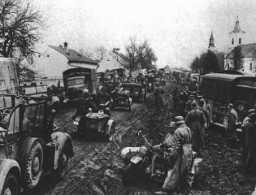You searched for: hiding
<< Previous | Displaying results 301-325 of 499 for "hiding" | Next >>
-
Selma (Wijnberg) Engel describes forced labor sorting the clothing and possessions of people deported to Sobibor
Oral HistorySelma was the youngest of four children born to Jewish parents. When she was 7, Selma and her family moved to the town of Zwolle where her parents ran a small hotel. When the Germans invaded the Netherlands in 1940, they confiscated the hotel. The family had to live in a poor Jewish section of the town. Selma went into hiding but was betrayed and then sent to the Westerbork camp. In April 1943 she was deported to Sobibor, where she worked in the clothes sorting area. There, the prisoners tried to pocket…
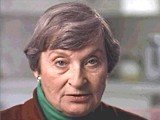
-
Vladka (Fagele) Peltel Meed describes smuggling a description of the Treblinka camp to underground leaders on the "Aryan" side of Warsaw
Oral HistoryVladka belonged to the Zukunft youth movement of the Bund (the Jewish Socialist party). She was active in the Warsaw ghetto underground as a member of the Jewish Fighting Organization (ZOB). In December 1942, she was smuggled out to the Aryan, Polish side of Warsaw to try to obtain arms and to find hiding places for children and adults. She became an active courier for the Jewish underground and for Jews in camps, forests, and other ghettos.
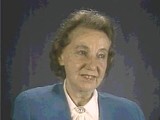
-
Ruth Webber describes escaping from a selection held in the Auschwitz infirmary
Oral HistoryRuth was four years old when the Germans invaded Poland and occupied Ostrowiec. Her family was forced into a ghetto. Germans took over her father's photography business, although he was allowed to continue working outside the ghetto. Before the ghetto was liquidated, Ruth's parents sent her sister into hiding, and managed to get work at a labor camp outside the ghetto. Ruth also went into hiding, either in nearby woods or within the camp itself. When the camp was liquidated, Ruth's parents were split up.…
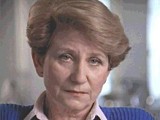
-
Leo Bretholz describes resistance training and activities in a French underground group he joined in 1943
Oral HistoryAfter the Germans annexed Austria in 1938, Leo attempted to flee. He eventually reached Belgium. In 1940 he was deported to the St.-Cyprien camp in France but escaped. In 1942 Leo was smuggled into Switzerland but was arrested and sent back to France, this time to the Rivesaltes and Drancy camps. He and a friend escaped from a train deporting them to Auschwitz in Poland. Leo joined the French underground in 1943. He arrived in the United States in 1947.
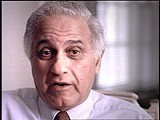
-
Ruth Webber describes the bitterness that she felt after the end of the war when she was in an orphanage in Krakow
Oral HistoryRuth was four years old when the Germans invaded Poland and occupied Ostrowiec. Her family was forced into a ghetto. Germans took over her father's photography business, although he was allowed to continue working outside the ghetto. Before the ghetto was liquidated, Ruth's parents sent her sister into hiding, and managed to get work at a labor camp outside the ghetto. Ruth also went into hiding, either in nearby woods or within the camp itself. When the camp was liquidated, Ruth's parents were split up.…
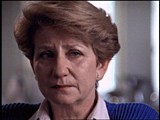
-
Ruth Webber describes the bitterness that she felt after the end of the war when she was in an orphanage in Krakow
Oral HistoryRuth was four years old when the Germans invaded Poland and occupied Ostrowiec. Her family was forced into a ghetto. Germans took over her father's photography business, although he was allowed to continue working outside the ghetto. Before the ghetto was liquidated, Ruth's parents sent her sister into hiding, and managed to get work at a labor camp outside the ghetto. Ruth also went into hiding, either in nearby woods or within the camp itself. When the camp was liquidated, Ruth's parents were split up.…

-
Ruth Webber describes the Auschwitz crematoria
Oral HistoryRuth was four years old when the Germans invaded Poland and occupied Ostrowiec. Her family was forced into a ghetto. Germans took over her father's photography business, although he was allowed to continue working outside the ghetto. Before the ghetto was liquidated, Ruth's parents sent her sister into hiding, and managed to get work at a labor camp outside the ghetto. Ruth also went into hiding, either in nearby woods or within the camp itself. When the camp was liquidated, Ruth's parents were split up.…
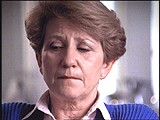
-
Ruth Webber describes witnessing a brutal punishment in the camp at Ostrowiec
Oral HistoryRuth was four years old when the Germans invaded Poland and occupied Ostrowiec. Her family was forced into a ghetto. Germans took over her father's photography business, although he was allowed to continue working outside the ghetto. Before the ghetto was liquidated, Ruth's parents sent her sister into hiding, and managed to get work at a labor camp outside the ghetto. Ruth also went into hiding, either in nearby woods or within the camp itself. When the camp was liquidated, Ruth's parents were split up.…
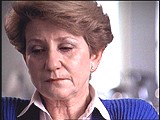
-
Combating Holocaust Denial: Origins of Holocaust Denial
ArticleLearn about some of the origins of Holocaust denial, including the euphemistic language the Nazis used to describe their policies and actions.
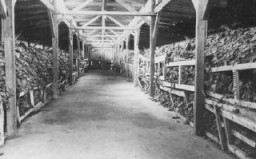
-
Rebecca Pissirilo
ID CardRebecca was the oldest of three children born to Ladino-speaking, Sephardic-Jewish parents. The Pissirilos lived in Kastoria, a small town in the mountainous region of Greek Macedonia near the Albanian border. Rebecca's father was a successful fabric merchant. The Pissirilo children attended public schools. 1933-39: After finishing elementary school, Rebecca went on to study at secondary school. She liked to sing and enjoyed studying. Rebecca kept a diary, like some of the other girls in her class. The…
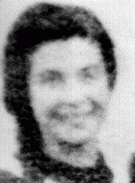
-
Jacob Unger
ID CardJacob was living in Essen, Germany, when he met and married Erna Schumer, who, like him, came from a religious Jewish background. The couple had two children, Max, born in 1923 and Dora, born in 1925. Jacob worked as a salesman, and in the evenings he tutored students in Hebrew. 1933-39: In 1933 when Hitler came to power, Jacob went to Amsterdam to explore the possibility of the family moving there. However, Erna did not want to leave her three sisters who were living in Essen, and she also believed that…
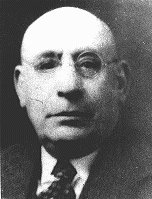
-
Warsaw district handbill announcing penalties for anyone caught assisting Jews
ArtifactOn September 5, 1942, the SS and Police Leader of the Warsaw District issued this announcement threatening the death penalty for anyone who aided Jews who had left the ghetto without authorization. This poster was put up in the wake of the mass deportation of Jews from the Warsaw ghetto to the Treblinka killing center in summer 1942. SS officials were well aware that thousands of Jews had fled the ghetto to go into hiding and urged people to turn them in. The poster reminds the city's non-Jewish…
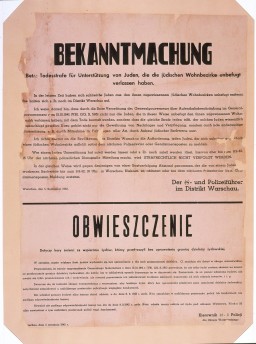
-
Ilona Haas Geroe
ID CardIlona was one of seven children born to a Jewish family in the city of Szeged, about 100 miles south of Budapest. Her father was an accountant. At the turn of the century many of Ilona's father's relatives emigrated to the United States, but Ilona's father decided to stay. Ilona also became an accountant and got a job in Szeged. 1933-39: Ilona's work as an accountant kept her busy but her free time was spent enjoying music and sports. She also began to study English since so many of her relatives had…
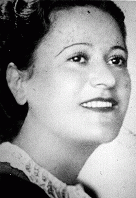
-
Gideon Boissevain
ID CardGideon was known affectionately as "Gi" by his family and friends. His parents were descended from the Huguenots, French Protestants who came to the Netherlands in the 16th and 17th centuries. Gi had two brothers and two sisters, and his father worked in the insurance business. 1933-39: Gi had a large circle of friends, both Christians and Jews, and after school they all liked to get together. He and his friends enjoyed taking bike trips, having parties, and playing records. In the mid-1930s his parents…
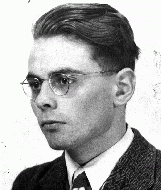
-
Robert Weinberger
ID CardRobert was raised in a German-speaking Jewish family in the Slovakian capital of Bratislava, where his father owned a dental supply business. Robert grew up bilingual: He learned Hungarian from his mother and he attended a German-language Jewish grammar school. 1933-39: When Hitler rose to power in Germany, anti-German sentiment grew in Slovakia and many Jews in Bratislava, like Robert's parents, who had originally identified with German culture, enrolled their children in Slovak schools. In March 1939…
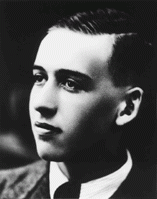
-
Preben Munch-Nielsen describes a fishing boat used to carry Jews to safety in Sweden
Oral HistoryPreben was born to a Protestant family in Snekkersten, a small fishing village. The Germans invaded Denmark in 1940. Preben became a courier in the resistance. When the Gestapo (German Secret State Police) began hunting down Jews in Denmark in October 1943, Preben helped hide refugees in houses near the shore and led them to boats which took them to Sweden. Preben himself had to take refuge in Sweden in November 1943. He returned to Denmark in May 1945.
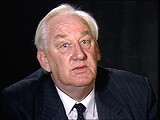
-
Sophie Turner-Zaretsky describes how the teddy bear brings her back to the past
Oral HistorySophie was born Selma Schwarzwald to parents Daniel and Laura in the industrial city of Lvov, two years before Germany invaded Poland. Daniel was a successful businessman who exported timber and Laura had studied economics. The Germans occupied Lvov in 1941. After her father's disappearance on her fifth birthday in 1941, Sophie and her mother procured false names and papers and moved to a small town called Busko-Zdroj. They became practicing Catholics to hide their identities. Sophie gradually forgot that…
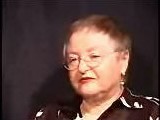
-
Lucine Horn describes the German occupation of Lublin
Oral HistoryLucine was born to a Jewish family in Lublin. Her father was a court interpreter and her mother was a dentist. War began with the German invasion of Poland on September 1, 1939. Lucine's home was raided by German forces shortly thereafter. Soon after the German occupation of Lublin, Jews there were forced to wear a compulsory badge identifying them as Jews. A ghetto in Lublin was closed off in January 1942. Lucine survived a series of killing campaigns and deportations from the ghetto during March and…
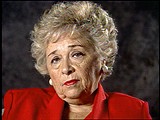
-
Lilly Appelbaum Malnik describes the process of registration in Auschwitz
Oral HistoryGermany invaded Belgium in May 1940. After the Germans seized her mother, sister, and brother, Lilly went into hiding. With the help of friends and family, Lilly hid her Jewish identity for two years. But, in 1944, Lilly was denounced by some Belgians and deported to Auschwitz-Birkenau via the Mechelen camp. After a death march from Auschwitz, Lilly was liberated at Bergen-Belsen by British forces.
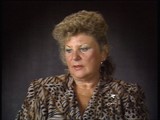
-
Tomasz (Toivi) Blatt describes gassing operations in the Sobibor killing center
Oral HistoryTomasz was born to a Jewish family in Izbica. After the war began in September 1939, the Germans established a ghetto in Izbica. Tomasz's work in a garage initially protected him from roundups in the ghetto. In 1942 he tried to escape to Hungary, using false papers. He was caught but managed to return to Izbica. In April 1943 he and his family were deported to Sobibor. Tomasz escaped during the Sobibor uprising. He went into hiding and worked as a courier in the Polish underground.
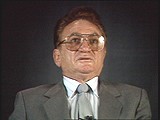
-
Marcelle Burakowski with her eight-year-old twin sisters, Berthe and Jenny
PhotoMarcelle Bock (born Marcelle Burakowski) was born in 1931. She was the oldest of three girls. She had twin sisters, two years younger than herself, named Berthe and Jenny. Her father worked as a tailor of men's overcoats. Marcelle is ten years old in this photograph. Her sisters are eight years old. Marcelle, her mother, and sisters were arrested during the roundup of July 16-17, 1942, and taken to the Vélodrome d'Hiver in Paris, France. Marcelle managed to escape during transit from…
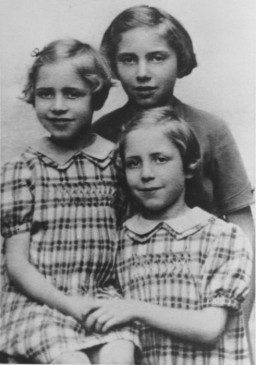
-
Sara Rachela Plagier
ArticleChildren's diaries bear witness to some of the most heartbreaking events of the Holocaust. Learn about the diary and experiences of Sara Rachela Plagier.
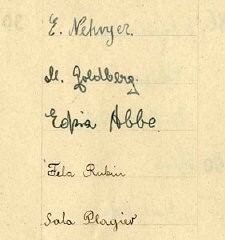
-
Vilna
ArticleDuring the Holocaust, the creation of ghettos was a key step in the Nazi process of ultimately destroying Europe's Jews. Learn about the Vilna ghetto.
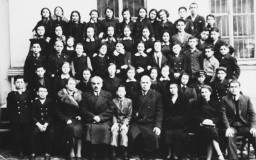
-
Stutthof
ArticleLearn about the Stutthof camp from its establishment until liberation in May 1945, including conditions, forced labor, subcamps, and death marches.
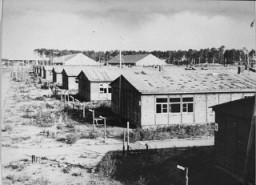
-
